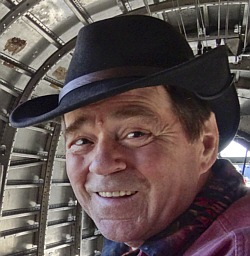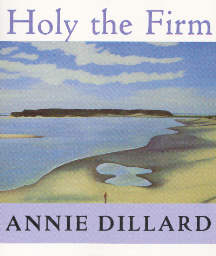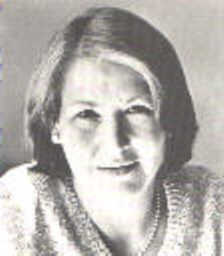"Every day is a god, each day is a god, and holiness holds forth in time." With the opening
words of this book, Annie Dillard sets us down, Holy and Firmly, and never lets go as we read on.
This is a short book, but who says Holy must be long, either in space or in time? She set me down, and I read it wholly in one day, an otherwise cloudy, rainy, and depressing day in February; she held me firmly in a holy place till I turned the last page, she held me in a place where the Sun rising is a god, the Puget Sound is a god, the Pacific is a god whose being is articulated by the surrounding scene.
She lives alone on Puget Sound with a cat and a spider. Doesn't sound like much company to
city folk, but few have paid so much attention to a tiny spider as she did.
How had she helped to kill a moth? Isn't that a wicked thing to do? In her case, it literally was
wicked. Camping years earlier in the Blue Ridge Mountains of Virginia, a continent away, she had
an adventure with a moth. Ever notice yourself how few adventures, close up and personal, with
Nature you have when a gang of people are around? I have. I have had adventures like the ones
she writes so lyrically about. The moth! The WICKED MOTH! She was a golden female moth
who flew into Annie's candle one night and burnt away, but not fully away.
Have you ever blown out a moth? Could you have continued reading for two hours by the light
of a moth-wicked candle? Annie did.
Annie tells us, "Nothing is going to happen in this book," but we have already met the wicked
moth and one room cabin with an all-glass wall opening to the lake and mountains, a voracious
spider, a cat named Small, and a person named Annie, who adds, "There is only a little violence
here and there in the language, at the corner where eternity clips time." (Page 24)
If you are reading your first book by Annie Dillard, you will likely feel "Newborn and Salted"
which is the title of Part One. One of the rituals my wife and I perform before we move into a new
house is to sprinkle salt around the outside perimeter of the building to keep unwanted spirits away.
Don't recall where I learn to perform this salting, but here Annie reveals some of the tradition's
origins.
[page 24] So I read. Armenians, I read, salt their newborn babies. I check
somewhere else: so did the Jews at the time of the prophets. They washed a
baby in water, salted him, and wrapped him in cloths. When God promised
Aaron and all the Levites all the offerings Israel made to God, the firstfruits
and the firstling livestock, "all the best of the oil, and all the best of the
wine," he said of his promise, "It is a covenant of salt forever." In the
Roman church baptism, the priest places salt in the infant's mouth.
Salt your eggs in the morning and you can feel created all day long, Annie says.
[page 25] There are some created sheep in the pasture below me, sheep set
down here precisely, just touching their blue shadows hoof to hoof on the
grass. Created gulls pock the air, rip great curved seams in the settled air: I
greet my created meal, amazed.
So it goes, as we read our created book, created by Annie Dillard, newborn and salted. But
she is a reader as well as a writer.
[page 30] I read. Like a rug or wrap rolling unformed up a loom, a day
discovers itself, like a poem.
Holy the Firm is like a long lyrical poem which unrolls itself before our eyes as we read, never
knowing how the intricate tapestry of loneliness and created-ness will weave its warp and woof of
meaning for us.
Can God lose a tooth? we ponder this as we read the title "God's Tooth" for Part Two,
which begins with a shock, "Into this world falls a plane." Those firs, which she reckoned as
god's fingers earlier, pulls an airplane out of the sky and it falls down like a loosened tooth, all white
and bloody to the ground. Annie's little friend, Julie, all of seven years old, lost her face in the flaming gasoline which leapt
on her as her father pulled her from the crumpled plane which didn't clear the firs at the end of the
small clearing. Annie remembers the day of cidering when Julie dressed up Small, Annie's cat, as a
nun in a long black gown with a white collar. Now Julie doesn't have a face and Annie finds that
hard to face, the possibility of a friend being blotted out.
[page 44] The pain with the millstones' pitiless turning is real, vaulting,
insofar as it is love, beyond the plane of the stones' sickening churn and
arcing to the realm of spirit bare. And you can get caught holding one end of
a love, when your father drops, and your mother; when a land is lost, or a
time, and your friend blotted out, gone, your brother's body spoiled, and
cold, your infant dead, and you dying: you reel out love's long line alone,
stripped like a live wire loosing its sparks to a cloud, like a live wire loosed
in space to longing and grief everlasting.
What meaning can we give the title, Holy the Firm? We get hints in the question which this next
passage builds up to, and the eponymous Part Three strives to answer.
[page 47] Faith would be, in short, that God has any willful connection with
time whatsoever, and with us. For I know it as given that God is all good.
And I take it also as given that whatever he touches has meaning, if only in
his mysterious terms, the which I readily grant. The question is, then,
whether God touches anything. Is anything firm, or is time on the loose?
Holy the Firm, she asks if that is the primary substance beneath all other substances, a holy
foundation stone, which supports all the metals and minerals that fill us during our earthly existence,
which underlies the salts, which as newborns we are connected with, which underlies the elements in
God's tooth.
[page 70, 71] But if Holy the Firm is "underneath salts," if Holy the Firm is
matter at its dullest, Aristotle's materia prima, absolute zero, and since
Holy the Firm is in touch with the Absolute at base, then the circle is
unbroken. And it is. Thought advances, and the world creates itself, by the
gradual positing of, and belief in, a series of bright ideas. Time and space
are in touch with the Absolute at base. Eternity sockets twice into time and
space curves, bound and bound by idea. Matter and spirit are of a piece but
distinguishable. God has a stake guaranteed in all the world. And the
universe is real and not a dream, not a manufacture of the senses; subject
may know object, knowledge may proceed, and Holy the Firm, is in short
the philosopher's stone.
Closing this wonderful meditation on life, Annie shares Julie's distress, visualizing her as a nun,
who is also shrouded in black with white trimmings, alone with God in her solitude and prayers.
[page 74] You might as well be a nun. You might as well be God’s chaste bride, chased by plunderers to the high caves of solitude, to the hearthless rooms empty of voices, and of warm limbs hooking your heart to the world. Look how he loves you! Are you bandaged
now, or loose in a sterilized room? Wait til they hand you a mirror, if you can hold one, and
know what it means. That skinlessness, that black shroud of flesh in strips on your skull, is
your veil. There are two kinds of nun, out of the cloister or in. You can serve or you can
sing, and wreck your heart in prayer, working the world's hard work. Forget whistling: you
have no lips for that, or kissing the face of a man or a child. Learn Latin, and it please my
Lord, learn the foolish downward look called Custody of the Eyes.
Next, she deftly blends Julie with the wicked moth, immolated in the flame, by which light
Annie read for two hours before blowing out the moth.
[page 76] Held, held fast by love in the world like the moth in wax, your life
a wick, your head on fire with prayer, held utterly, outside and in, you sleep
alone, if you call that alone, you cry God.
Living like a nun in a cloister of her own design and choosing, a one room cabin, Annie prayed
for Julie as she gazed to the mountains which framed her glass wall to the world, and made this
request and offer, "So live. I'll be the nun for you. I am now."
~^~
Any questions about this review, Contact: Bobby Matherne
~~~~~~~~~~~~~~~~~~~~~~~~~~~~~~~~~~~~~~~~~~~~~~~~~~~~~~~~~~

 == == == == == == == == == == == == == == == ==
== == == == == == == == == == == == == == == ==
22+ Million Good Readers have Liked Us
22,454,155
as of November 7, 2019
Mo-to-Date Daily Ave 5,528
Readers
For Monthly DIGESTWORLD Email Reminder:
Subscribe! You'll Like Us, Too!
== == == == == == == == == == == == == == == ==
Click Left Photo for List of All ARJ2 Reviews Click Right Bookcover for Next Review in List
Did you Enjoy this Webpage?
Subscribe to the Good Mountain Press Digest: Click Here!


CLICK ON FLAGS TO OPEN OUR FIRST-AID KIT.
All the tools you need for a simple Speed Trace IN ONE PLACE. Do you feel like you're swimming against a strong current in your life? Are you fearful? Are you seeing red? Very angry? Anxious? Feel down or upset by everyday occurrences? Plagued by chronic discomforts like migraine headaches? Have seasickness on cruises? Have butterflies when you get up to speak? Learn to use this simple 21st Century memory technique. Remove these unwanted physical body states, and even more, without surgery, drugs, or psychotherapy, and best of all: without charge to you.
Simply CLICK AND OPEN the
FIRST-AID KIT.

Counselor? Visit the Counselor's Corner for Suggestions on Incorporating Doyletics in Your Work.

All material on this webpage Copyright 2019 by Bobby Matherne





